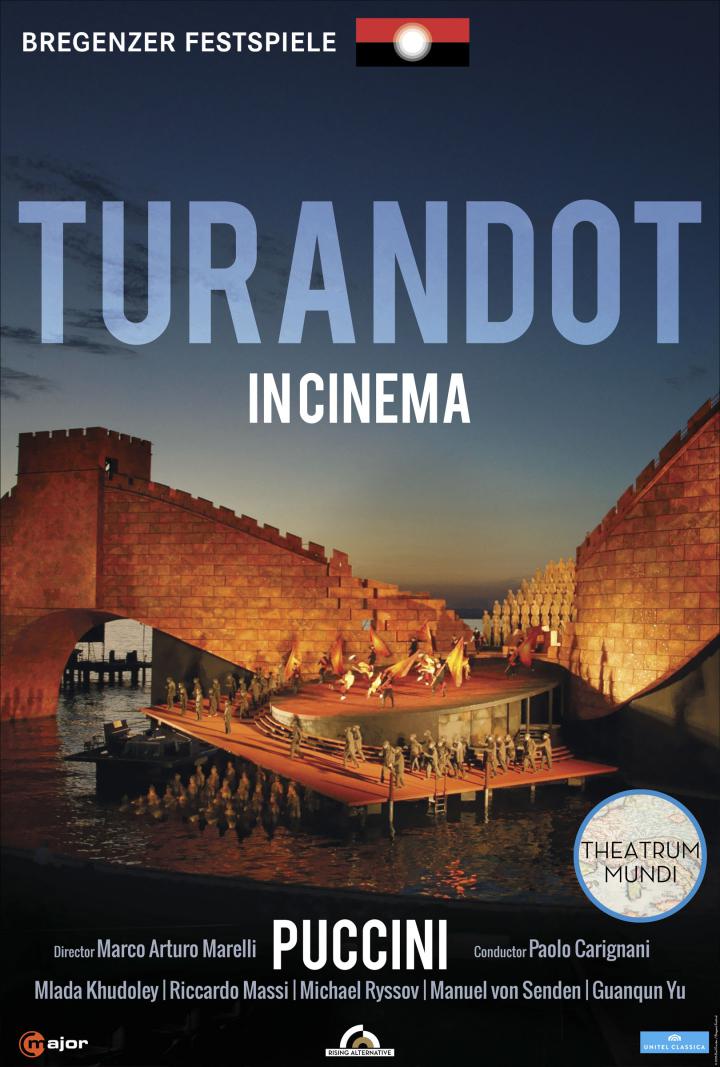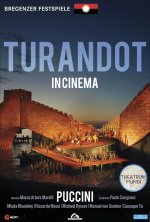Turandot
Turandot
(Bregenz Festival)
Part of our Culture Vulture series. For more screenings and information, visit: www.laemmle.com/culturevulture.
Unitel Classica + Rising Alternative + Bregenz Festival + CMajor
Opera in 3 acts
Sung in Italian
Bregenzer Festspiele (Bregenz Festival)
Recorded live July 2015
Libretto by Giuseppe Adami and Renato Simoni after the play by Carlo Gozzi
Approximate Running Time: 2h 10min (130 min)
CREATIVE TEAM
Conductor Paolo Carignani
Director and Set Designer Marco Arturo Marelli
Costume Designer Constance Hoffman
Video Designer Aron Kitzig
Lighting Designer Davy Cunningham
Choreographer Ran Arthur Braun
Video Director Felix Breisach
Vienna Symphony Orchestra
Prague Philharmonic Choir Chorus Master, Benjamin Lack
Bregenz Festival Chorus Chorus Master, Benjaimn Lack
ARTISTIC TEAM
The Princess Turandot Mlada Khudoley
Calaf Riccardo Massi
Liù Guanqun Yu
The Emperor Altoum Manuel von Senden
Timur Michael Ryssov
Ping Andrè Schuen
Pang Taylan Reinhard
Pong Cosmin ifrim
Un Mandarino Yasushi Hirano
PRESENTATION
No man shall ever possess her – the Chinese princess Turandot sets three riddles for every man that comes to woo her. So far none have been able to solve the riddles, and have paid with their heads. Then an unknown prince achieves the impossible: he correctly answers all three questions. But Turandot is still unwilling to surrender to him. So the Prince is ready to lay down his life if she can find out his name by morning. Throughout the night, no one may sleep: everyone must try to discover his name...
It is this aria sung by Calaf, ‘Nessun dorma,‘ that made Giacomo Puccini‘s opera Turandot world famous. On the Bregenz stage it‘s delivered against the imposing backdrop of a dragon-shaped wall on Lake Constance. Marco Arturo Marelli‘s stage set makes use of Chinese symbols of power. The stage wall is inspired by the world‘s longest man-made structure, the Great Wall of China. The Bregenz wall is criss-crossed by detachments of terracotta warriors, over two hundred in all, some of them sky-high, others half-submerged in the water.
There are Chinese elements in the music, too. Puccini was inspired by tunes from music boxes that a diplomat friend brought back from China. But however Chinese Puccini’s last opera might appear, the plot is adapted from a Persian tale and the score is full-blown Italian opera. The powerful Turandot is contrasted with the self-sacrificing Liù, who loves Prince Calaf and knows his name but movingly takes the secret to her grave. The populace mourns her death as passionately as previously it relished the spectacle of Turandot’s suitors being beheaded. Fire artists, dancers and soldiers accompany Turandot‘s entrance in Act Two. Before she sets the Prince her riddles, she reveals why she is so hardhearted: long ago a female ancestor of hers was abused and murdered by a man.
Finally, however, Calaf‘s love is able to break the mask of Turandot‘s ancestress. As Puccini wanted, the two of them ‘descend through love to the level of mankind, and this love must at the end take possession of the whole stage‘.
SYNOPSIS
Act I
A mandarin proclaims Princess Turandot’s grim decree: all who seek her hand in marriage and who fail to answer three riddles shall be executed at moonrise. Among the crowd is Calaf, a foreign prince, who is reunited with his father Timur and the slave girl Liù. The moon appears in the sky and Turandot enters, signalling the execution of the Prince of Persia. Calaf is dazzled by her beauty and in spite of being warned against doing so, he decides to seek Turandot’s hand in marriage.
Act II
Ping, Pang and Pong are concerned about Turandot’s cruelty. They worry about China’s future and dream of better times. The Emperor Altoum enters with his daughter. She feels that she is the re-embodiment of a female ancestor who was ravished and murdered by a man. She sets Calaf three riddles to solve, each of which he answers correctly. Turandot is unwilling to give herself voluntarily to him. But this is precisely what Calaf wants: love without constraint. And so he sets Turandot a riddle in turn: if she discovers his name by dawn, he will be ready to die.
Act III
Turandot threatens her people with the death sentence: they are not to sleep but must find out the prince’s name. Ping, Pang and Pong try to discover his secret. Timur and Liù are captured and she is tortured, but she refuses to reveal the prince’s name: love, she says, gives her the strength to resist the unspeakable torments. She then takes her own life. Calaf approaches Turandot and kisses her.
For the first time in her life she learns the mystery of love and tells her father in the presence of their people the name of the foreign prince: it is “Love”.
Opera in 3 acts
Sung in Italian
Bregenzer Festspiele (Bregenz Festival)
Recorded live July 2015
Libretto by Giuseppe Adami and Renato Simoni after the play by Carlo Gozzi
Approximate Running Time: 2h 10min (130 min)
CREATIVE TEAM
Conductor Paolo Carignani
Director and Set Designer Marco Arturo Marelli
Costume Designer Constance Hoffman
Video Designer Aron Kitzig
Lighting Designer Davy Cunningham
Choreographer Ran Arthur Braun
Video Director Felix Breisach
Vienna Symphony Orchestra
Prague Philharmonic Choir Chorus Master, Benjamin Lack
Bregenz Festival Chorus Chorus Master, Benjaimn Lack
ARTISTIC TEAM
The Princess Turandot Mlada Khudoley
Calaf Riccardo Massi
Liù Guanqun Yu
The Emperor Altoum Manuel von Senden
Timur Michael Ryssov
Ping Andrè Schuen
Pang Taylan Reinhard
Pong Cosmin ifrim
Un Mandarino Yasushi Hirano
PRESENTATION
No man shall ever possess her – the Chinese princess Turandot sets three riddles for every man that comes to woo her. So far none have been able to solve the riddles, and have paid with their heads. Then an unknown prince achieves the impossible: he correctly answers all three questions. But Turandot is still unwilling to surrender to him. So the Prince is ready to lay down his life if she can find out his name by morning. Throughout the night, no one may sleep: everyone must try to discover his name...
It is this aria sung by Calaf, ‘Nessun dorma,‘ that made Giacomo Puccini‘s opera Turandot world famous. On the Bregenz stage it‘s delivered against the imposing backdrop of a dragon-shaped wall on Lake Constance. Marco Arturo Marelli‘s stage set makes use of Chinese symbols of power. The stage wall is inspired by the world‘s longest man-made structure, the Great Wall of China. The Bregenz wall is criss-crossed by detachments of terracotta warriors, over two hundred in all, some of them sky-high, others half-submerged in the water.
There are Chinese elements in the music, too. Puccini was inspired by tunes from music boxes that a diplomat friend brought back from China. But however Chinese Puccini’s last opera might appear, the plot is adapted from a Persian tale and the score is full-blown Italian opera. The powerful Turandot is contrasted with the self-sacrificing Liù, who loves Prince Calaf and knows his name but movingly takes the secret to her grave. The populace mourns her death as passionately as previously it relished the spectacle of Turandot’s suitors being beheaded. Fire artists, dancers and soldiers accompany Turandot‘s entrance in Act Two. Before she sets the Prince her riddles, she reveals why she is so hardhearted: long ago a female ancestor of hers was abused and murdered by a man.
Finally, however, Calaf‘s love is able to break the mask of Turandot‘s ancestress. As Puccini wanted, the two of them ‘descend through love to the level of mankind, and this love must at the end take possession of the whole stage‘.
SYNOPSIS
Act I
A mandarin proclaims Princess Turandot’s grim decree: all who seek her hand in marriage and who fail to answer three riddles shall be executed at moonrise. Among the crowd is Calaf, a foreign prince, who is reunited with his father Timur and the slave girl Liù. The moon appears in the sky and Turandot enters, signalling the execution of the Prince of Persia. Calaf is dazzled by her beauty and in spite of being warned against doing so, he decides to seek Turandot’s hand in marriage.
Act II
Ping, Pang and Pong are concerned about Turandot’s cruelty. They worry about China’s future and dream of better times. The Emperor Altoum enters with his daughter. She feels that she is the re-embodiment of a female ancestor who was ravished and murdered by a man. She sets Calaf three riddles to solve, each of which he answers correctly. Turandot is unwilling to give herself voluntarily to him. But this is precisely what Calaf wants: love without constraint. And so he sets Turandot a riddle in turn: if she discovers his name by dawn, he will be ready to die.
Act III
Turandot threatens her people with the death sentence: they are not to sleep but must find out the prince’s name. Ping, Pang and Pong try to discover his secret. Timur and Liù are captured and she is tortured, but she refuses to reveal the prince’s name: love, she says, gives her the strength to resist the unspeakable torments. She then takes her own life. Calaf approaches Turandot and kisses her.
For the first time in her life she learns the mystery of love and tells her father in the presence of their people the name of the foreign prince: it is “Love”.
Genre
Culture Vulture,
Opera
Runtime
130
Language
Italian
Played at
Monica Film Center 6.06.16 - 6.07.16
Fine Arts Theatre 6.06.16 - 6.07.16
Playhouse 7 6.06.16 - 6.07.16
Claremont 5 6.06.16 - 6.07.16
Town Center 5 6.06.16 - 6.07.16
Turandot Get Tickets
There are currently no showtimes for this film. Please check back soon.

